If you’re an LGBTQ+ teen, it’s essential to know you’re not alone in facing mental health challenges like anxiety and depression. Supportive family and friends can greatly boost your well-being. Look for affirmative school environments and counseling services tailored to your experiences. Join community centers and LGBTQ groups for resources. Remember, accessing the right support can make a big difference. Stay close for more insights on building a supportive network and advocacy resources available to you.
Key Takeaways
- Seek out LGBTQ-friendly clinics for specialized healthcare and gender-affirming medical care tailored to your needs.
- Engage with supportive family members and open conversations to foster acceptance and improve mental health outcomes.
- Join or create Gay-Straight Alliances (GSAs) in schools for a safe space and community support.
- Utilize online directories to find affirming mental health providers who understand LGBTQ+ issues.
- Access resources from organizations like Love is Respect for help with dating violence and personal safety.
Understanding Mental Health Challenges for LGBTQ Youth
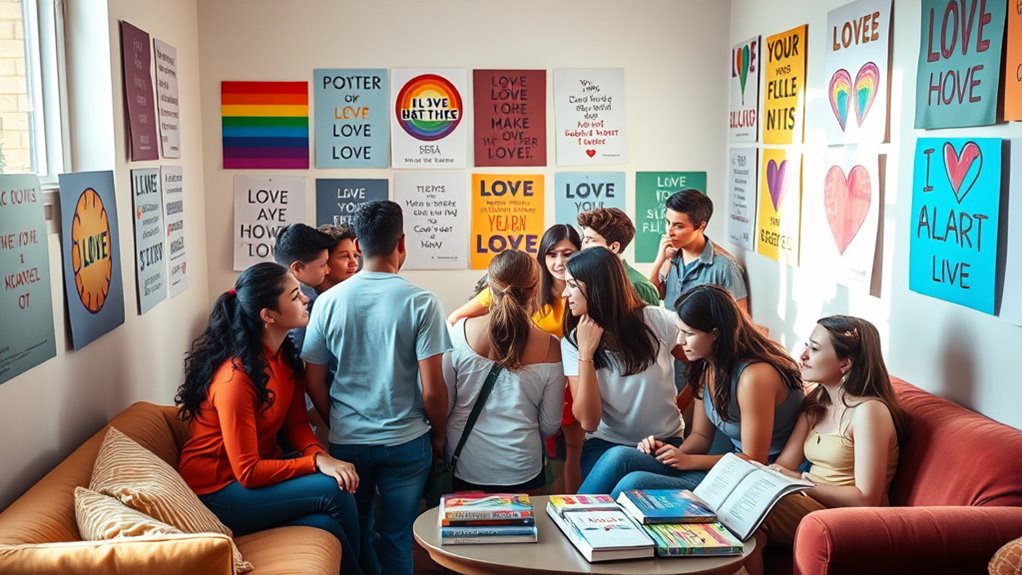
Understanding the mental health challenges faced by LGBTQ youth is essential, especially since they often navigate a world filled with discrimination and stigma.
You might be surprised to learn that 39% of LGBTQ+ youth have seriously considered suicide, with even higher rates among transgender and nonbinary individuals. Additionally, over half of LGBTQ+ youth experience symptoms of depression and anxiety, considerably more than their heterosexual peers.
Bullying and anti-LGBTQ+ policies worsen these mental health struggles. Unfortunately, many don’t receive the care they need, fearing judgment or rejection from healthcare providers. Notably, 56% of those seeking mental health care were unable to obtain it, highlighting the urgent need for inclusive mental health services.
The need for inclusive mental health services is critical, as is early intervention and support from LGBTQ+-focused organizations. Understanding these challenges can help create a more supportive environment for LGBTQ youth.
The Role of Family and Social Support
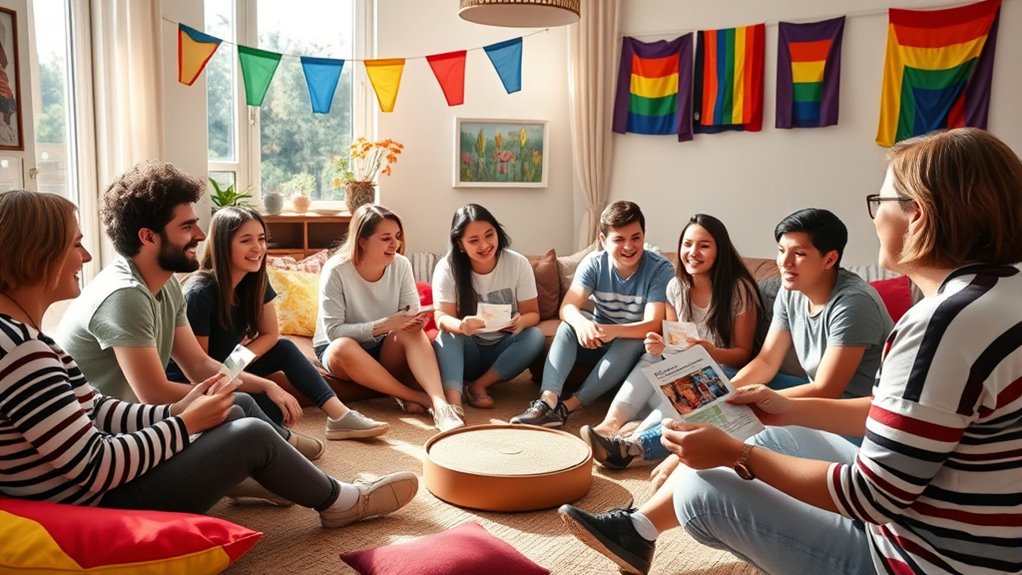
Family and social support play a pivotal role in the lives of LGBTQ youth, especially after recognizing the mental health challenges many face. When you have supportive family members, your mental health improves, and the risk of suicide decreases. Additionally, high family acceptance is linked to higher self-esteem and better overall health outcomes. In contrast, family rejection can lead to higher rates of depression and substance use. Sadly, only 24% of LGBTQ youth feel they can truly be themselves at home.
To foster a supportive environment, your family can engage in open conversations about your identity, respect your chosen labels, and participate in LGBTQ events. Additionally, connecting with peers and community groups enhances your sense of belonging. Remember, having allies, whether family or friends, can make all the difference in maneuvering life’s challenges.
Creating Affirmative School Environments
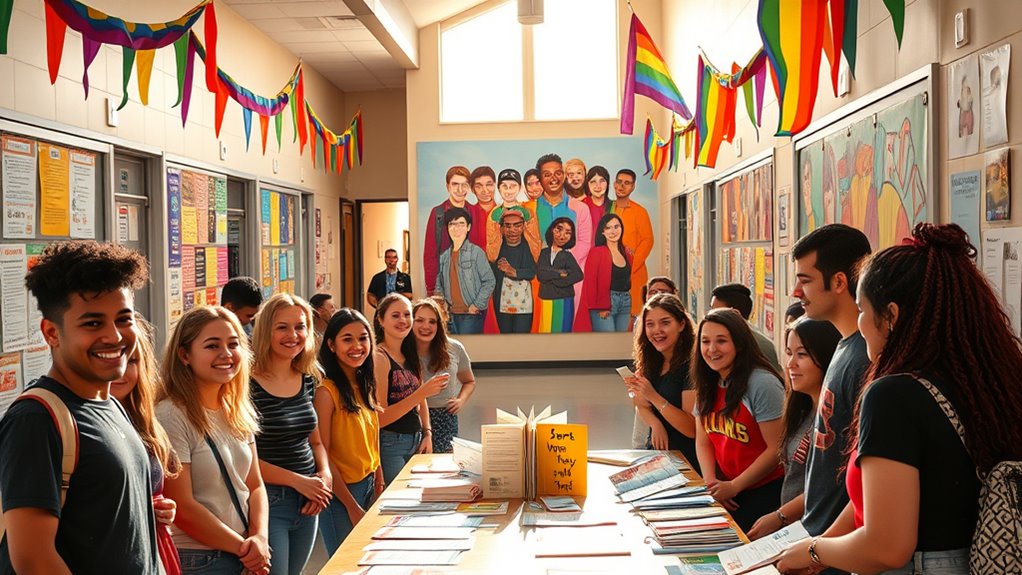
Creating affirmative school environments is essential for supporting LGBTQ+ students, as these spaces can greatly impact their well-being and academic success. Implementing inclusive policies protects students from harassment and fosters a supportive atmosphere for everyone. When educators receive training to address LGBTQ+ needs, they contribute to a more positive climate, effectively reducing bullying and promoting inclusivity. Establishing Gay-Straight Alliances (GSAs) and safe spaces within schools enhances feelings of safety and belonging, providing platforms for advocacy. Incorporating LGBTQ+-inclusive curricula that embrace diverse identities not only improves engagement but also reinforces a sense of belonging among all students.
Addressing Teen Dating Violence and Safety
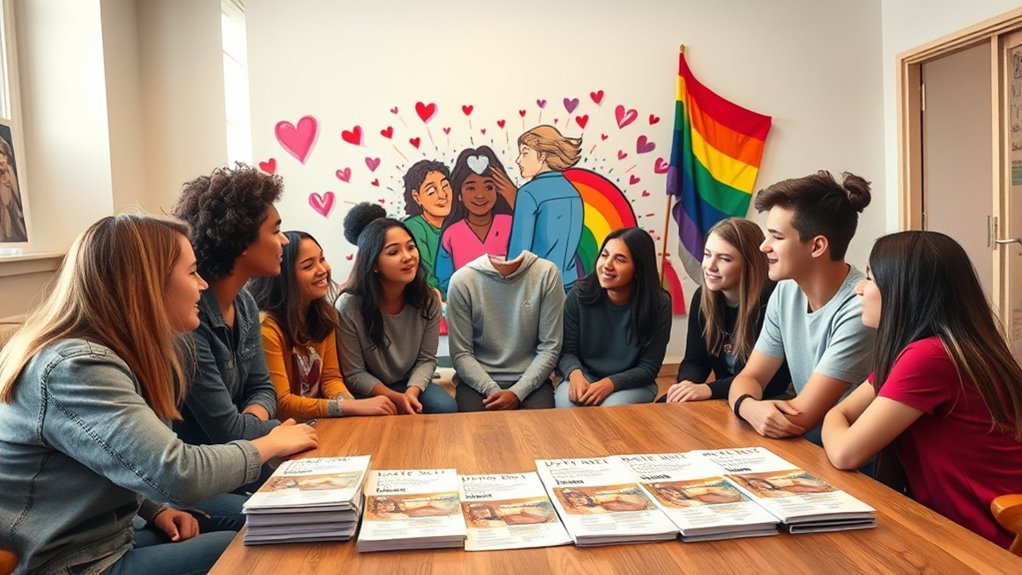
While many teens face challenges in their relationships, LGBT+ youth often encounter unique risks that can lead to higher rates of dating violence. Studies show that transgender teens experience physical dating violence at alarming rates, with some estimates as high as 88.9%. Emotional abuse affects about 59% of LGBT+ youth, and cyber dating abuse is reported by around 37%. Over 71% of women and over 55% of men first experienced intimate partner violence under age 25, which highlights the importance of addressing these issues early on. These experiences can greatly disrupt your education and social life. It’s essential to seek support from organizations like Love is Respect or Break the Cycle, which provide resources for those facing dating violence. Schools can help by training counselors to support LGBT+ youth in creating safe environments. Remember, you’re not alone, and there are people and resources ready to help you navigate these challenges.
Accessing Affirming Care and Resources
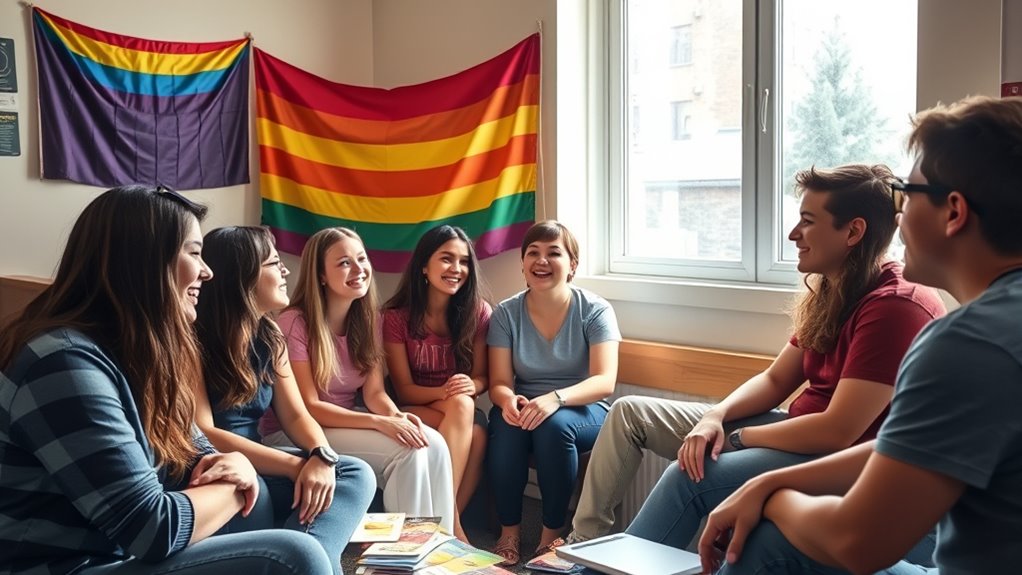
Accessing affirming care and resources is essential for LGBTQ+ youth, especially as they navigate their identities and health needs. Many cities have LGBTQ-friendly clinics that offer specialized healthcare, including gender-affirming medical care like hormone therapy and puberty blockers.
These services are critical for transgender youth and require providers who respect their identities. Mental health support is equally important; counseling tailored to LGBTQ+ issues can help you cope with emotional challenges and reduce feelings of isolation.
Online directories can help you find affirming healthcare providers nearby. Remember, confidentiality and culturally competent care are fundamental for feeling safe when seeking help.
Don’t hesitate to reach out to community centers for additional support and resources designed specifically for LGBTQ+ youth.
Advocacy and Policy Support for LGBTQ Youth
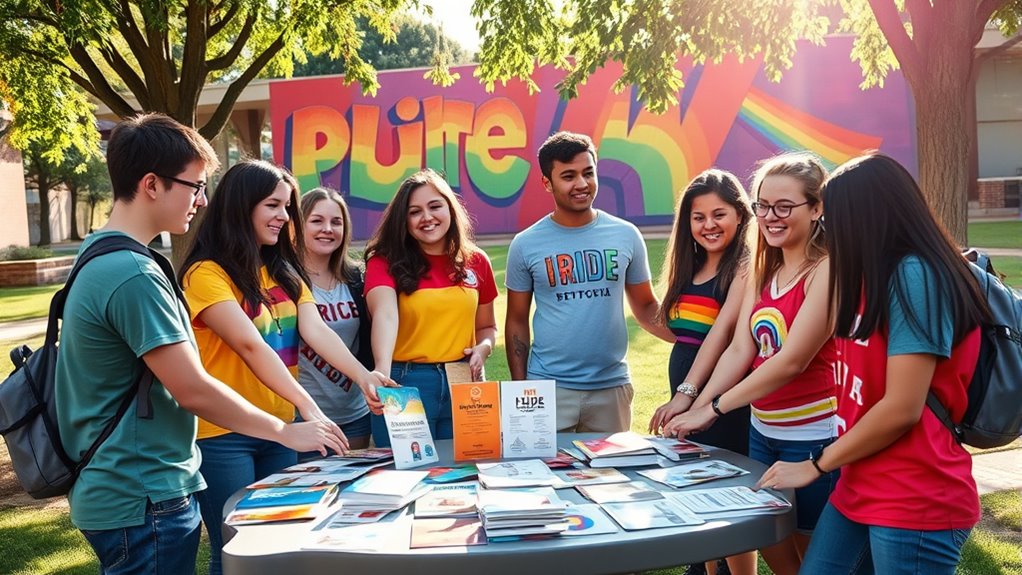
Advocacy and policy support play an essential role in guaranteeing that LGBTQ youth can thrive in safe and inclusive environments.
Organizations like True Colors United and The Trevor Project actively push for laws that protect your rights, such as the Runaway and Homeless Youth Trafficking Prevention Act. The Safe Schools Improvement Act aims to shield you from bullying and harassment.
Meanwhile, GLSEN focuses on creating affirming school policies. The ACLU guarantees your right to express yourself is respected.
Training and education for advocates are crucial, so programs like National CASA offer resources to better support you.
Frequently Asked Questions
What Are the Signs of Mental Health Issues in LGBTQ Teens?
When you’re noticing signs of mental health issues, look for increased anxiety, feelings of sadness, or withdrawal from activities you once enjoyed.
You might feel overwhelmed by stress, especially related to identity or societal pressures. If you express hopelessness or engage in self-harm, it’s crucial to seek support.
How Can I Find Lgbtq-Friendly Therapists or Counselors?
To find LGBTQ-friendly therapists, start by checking online directories like Psychology Today or Mental Health Match.
You can also explore online therapy platforms like Talkspace that cater specifically to LGBTQ clients.
Reach out to organizations like The Trevor Project for referrals.
If you prefer in-person sessions, local community clinics often have LGBTQ-friendly professionals available.
What Should I Do if I Experience Bullying at School?
If you’re caught in a storm of bullying at school, it’s essential to take action.
Don’t hesitate to talk to a trusted adult—be it a teacher, counselor, or family member. Document the incidents, keeping a record of what happened and when.
Seek support from friends and consider joining a club that promotes inclusivity.
How Can I Support a Friend Who Is Struggling With Their Identity?
If you want to support a friend struggling with their identity, start by creating a safe space for them to share their feelings.
Listen actively and without judgment, validating their experiences. Encourage them to explore their identity at their own pace and remind them they’re not alone.
Help them connect with supportive communities or resources, and stand up against any negativity they face.
Your empathy and understanding can make a significant difference in their journey.
Are There LGBTQ Youth Organizations or Clubs I Can Join Locally?
Absolutely, there are several LGBTQ youth organizations and clubs you can join locally.
Look for groups like the Gay Straight Alliance at your school or nearby community centers that offer support and activities.
Many cities have dedicated organizations like Lambda Legal or the L.A. Gay & Lesbian Center, where you can connect with others and participate in advocacy.
Engaging with these groups can help you find community and support.
Conclusion
To sum up, it’s essential to recognize the unique challenges LGBTQ youth face. Did you know that nearly 40% of LGBTQ teens report feeling depressed compared to just 14% of their heterosexual peers? By fostering supportive environments at home, school, and in the community, we can make a significant difference in their mental health and overall well-being. Let’s work together to create a safe space where every teen can thrive and be their authentic selves.









